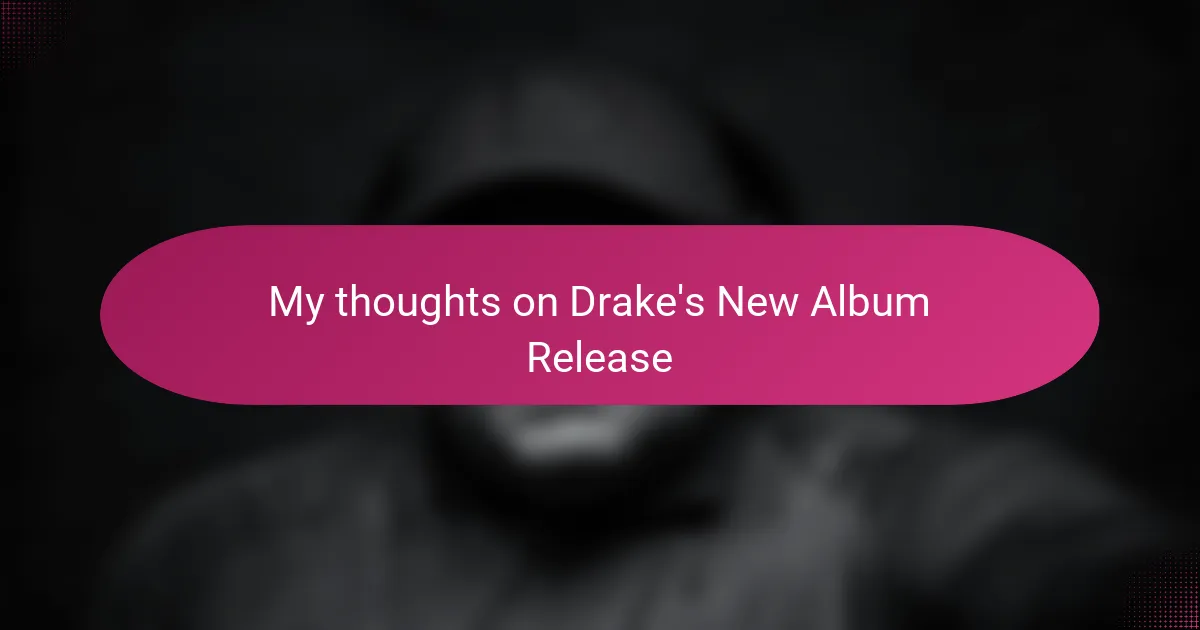Key takeaways
- Drake’s music uniquely blends rap and R&B, showcasing vulnerability and storytelling that resonates emotionally with listeners.
- His new album displays a mature evolution, combining introspective lyrics with high-energy production, reflecting his growth as an artist.
- The album addresses key themes such as the tension between fame and loneliness, capturing the emotional complexities of success.
- Drake’s influence is redefining industry standards, encouraging greater vulnerability and depth in mainstream rap music.
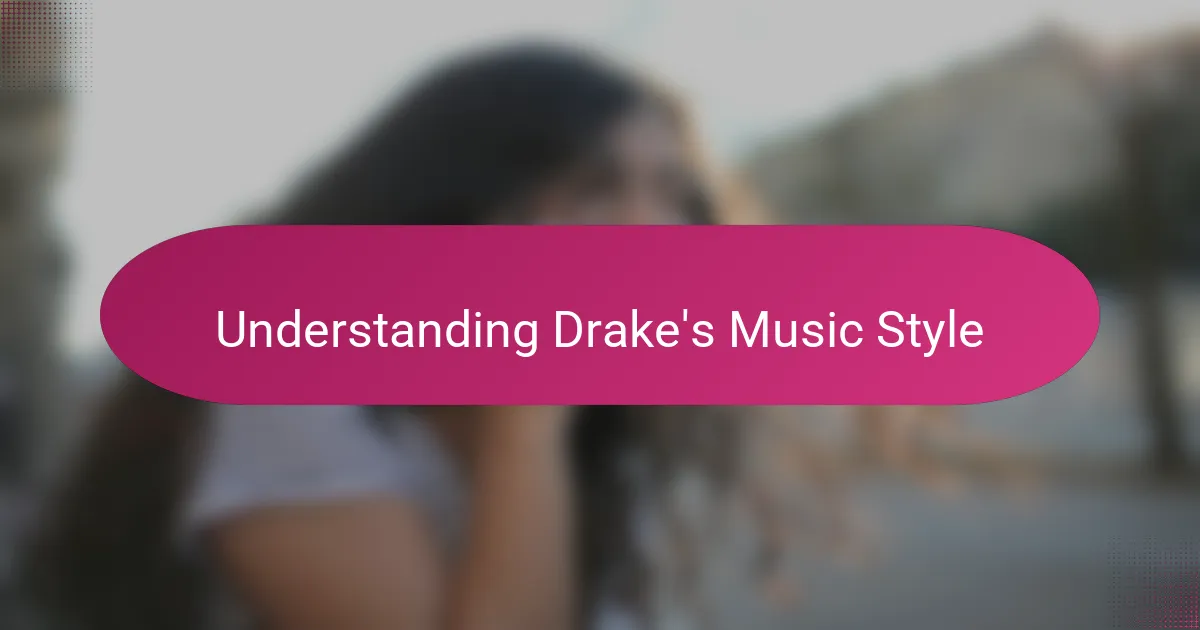
Understanding Drake’s Music Style
Drake’s music style has always struck me as a unique blend of rap and R&B, where vulnerability meets confident swagger. I often find myself drawn to how he effortlessly switches from hard-hitting verses to melodic hooks, making his songs feel both personal and catchy. Have you ever noticed how his lyrics can sound like a conversation with a close friend, yet packed with a deeper emotional layer?
What stands out to me most is his ability to convey emotion without losing his edge. His storytelling isn’t just about bragging or partying—it’s about struggles, relationships, and success, often all tangled in the same verse. This mix of honesty and ambition creates a soundscape that’s both relatable and aspirational, something I think many artists strive for but few achieve with the same finesse.
One unforgettable moment for me was when I realized Drake doesn’t just rap or sing to fill space—he uses his voice as an instrument to set a mood. Whether it’s a somber tone or an upbeat flow, his delivery always feels intentional. It makes me wonder: how many artists really master that balance between style and substance like he does?
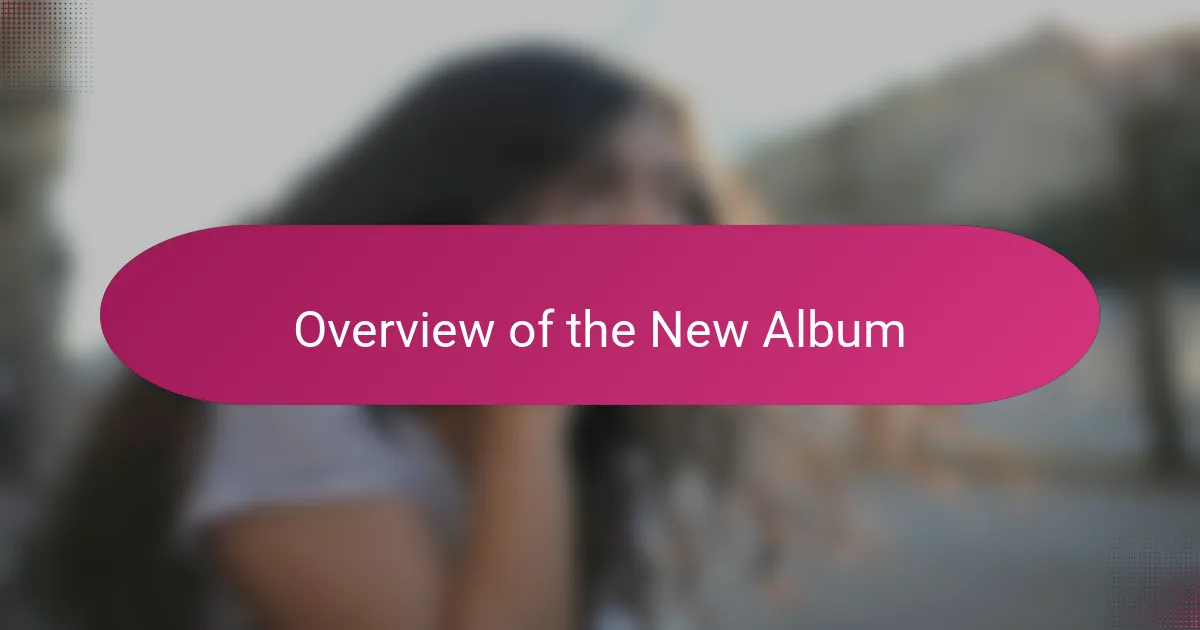
Overview of the New Album
Listening to Drake’s new album, I immediately noticed how he continues to evolve while staying true to his signature sound. The tracks flow seamlessly between introspective moments and high-energy bangers, which for me feels like a reflection of his growth both as an artist and a person. Have you ever experienced an album that takes you through a whole emotional journey in under an hour? That’s exactly what this one does.
One thing that caught my attention is the production quality; it feels polished yet raw in the right places. I appreciate how some beats hit hard and aggressive, while others give space for Drake’s voice to carry vulnerability and reflection. This contrast keeps me engaged throughout, making it impossible to skip any track.
It also feels like Drake’s storytelling has sharpened here—there’s a maturity in how he addresses themes like success, loss, and identity. I found myself nodding along, remembering my own moments of doubt and determination as his words echoed them back. Isn’t that the magic of great music? When it connects so personally, even across a speaker?
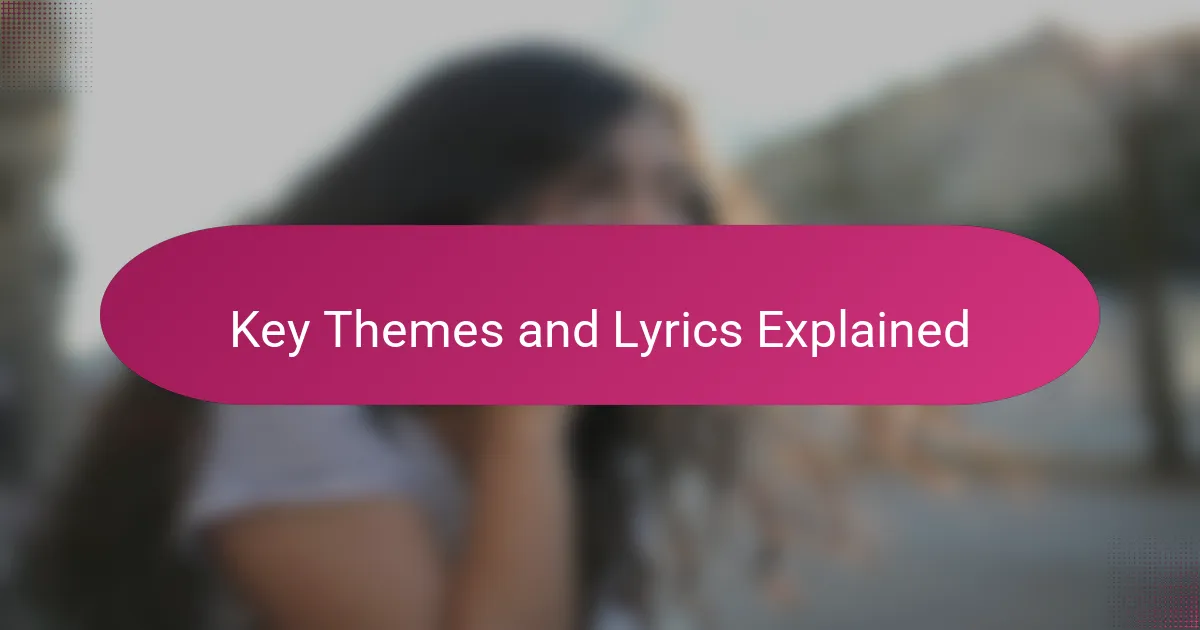
Key Themes and Lyrics Explained
What really struck me in this album are the key themes Drake explores—especially the tension between fame and loneliness. I noticed how his lyrics dive deep into the cost of success, revealing moments of vulnerability that feel incredibly human. Have you ever felt that pull between wanting it all and fearing what it takes to get there? That’s exactly the feeling Drake captures so well here.
His wordplay often intertwines reflections on relationships with his rise in the music industry, making each line layered with multiple meanings. I remember one verse where he juxtaposes romantic doubt with business ambition, which made me pause and think about how complicated life can get when these worlds collide. It’s like he’s inviting us into his inner circle, showing not just the glamor but also the emotional weight behind it.
What fascinates me most is how the lyrics use subtle storytelling instead of overt declarations. Drake doesn’t just tell you what’s happening—he paints a mood. In tracks where he’s wrestling with identity or regret, the lines stick with me long after the song ends, prompting me to reflect on my own experiences. Isn’t that what truly powerful lyrics do? They don’t just entertain, they resonate.
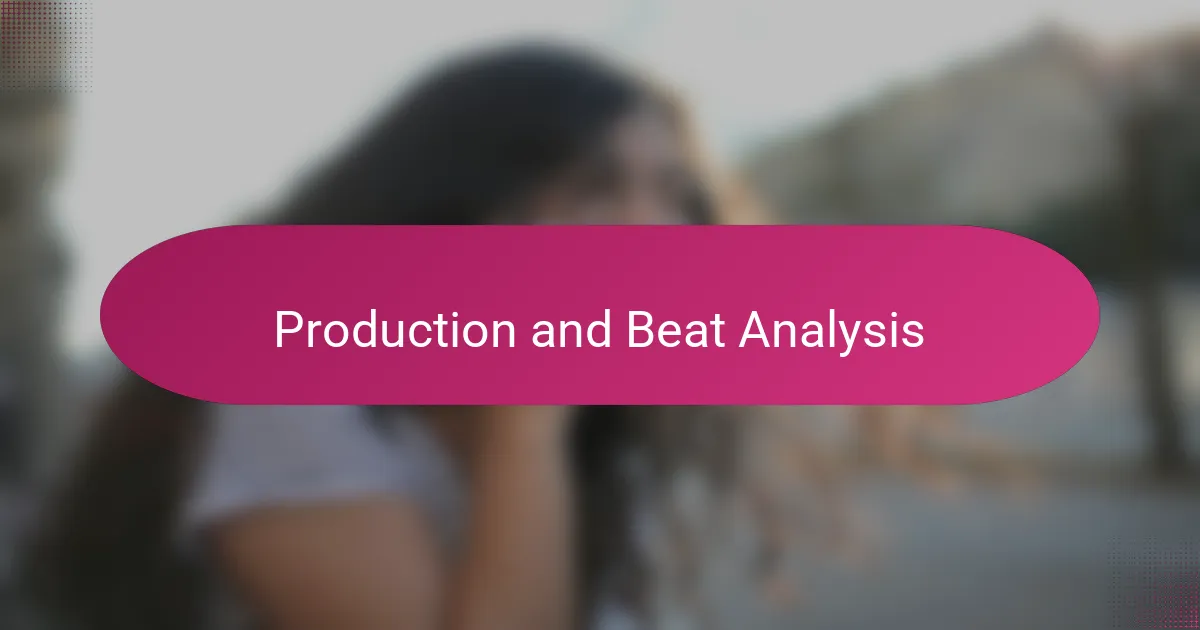
Production and Beat Analysis
Drake’s new album showcases production that feels both expansive and intimate. I was struck by how the beats don’t just serve as a backdrop but actively shape the mood of each track. For example, the use of sparse piano keys alongside deep bass creates a space where Drake’s voice can really breathe and connect emotionally.
What caught my ear most were the innovative layering techniques—subtle synths mixed with hard-hitting drums give several songs a dynamic edge that keeps me hooked. Have you noticed how the beat sometimes feels almost like a pulse, syncing perfectly with the emotions in Drake’s delivery? It’s that kind of thoughtful production that elevates the listening experience beyond just catchy tunes.
One beat that particularly stood out to me had this haunting, almost hypnotic quality. It reminded me of late-night solitude, where every sound feels amplified and introspective. That deep atmosphere works hand-in-hand with Drake’s vulnerability, making the entire track feel like a candid moment captured in time. Isn’t that the kind of production artistry that makes an album timeless?
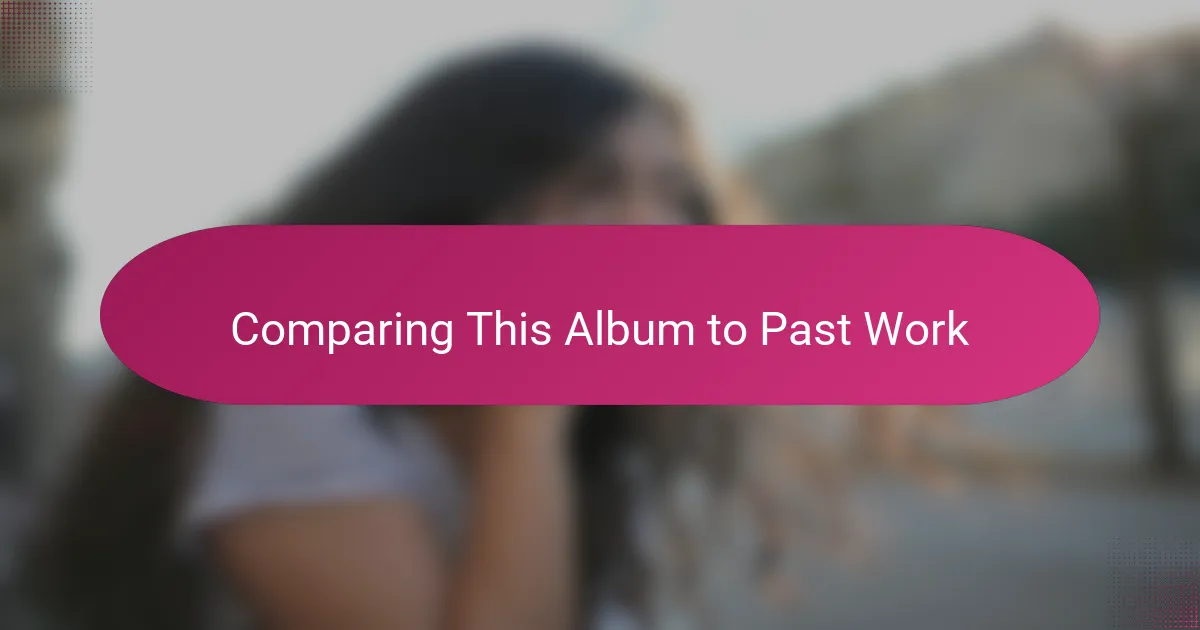
Comparing This Album to Past Work
When I compare this album to Drake’s earlier work, what really stands out is how he’s matured without losing his core identity. The confident swagger is still there, but now it’s wrapped in layers of reflection and nuance that weren’t as pronounced before. It makes me think about how artists evolve—do they hold on tight to what made them famous, or do they embrace change even if it risks alienating some fans? Drake seems to manage that balance better than most.
I also noticed that the emotional range on this album feels broader. In past projects, there was a clear line between his rap bravado and melodic vulnerability, but here those lines blur more seamlessly. It’s like he’s inviting us deeper into his world, sharing not just stories but the raw feelings behind them. I remember feeling a bit of surprise the first time I heard a track that was both hard-hitting and hauntingly introspective; it caught me off guard in the best way.
At the same time, the production shifts subtly but meaningfully from what I’ve heard before. The beats aren’t just background anymore—they tell their own story alongside Drake’s lyrics. When I replayed some older albums after listening to this one, the contrast was striking; those earlier beats were sharper and more straightforward, while now there’s this textured, almost cinematic feel that adds weight to his narratives. It’s like watching an artist not just grow, but truly deepen their craft.

Personal Favorite Tracks and Why
One track that immediately caught my attention was the one where Drake’s vulnerability shines through most starkly. The way he blends raw emotion with a smooth flow made me pause and really listen—not just hear—the story he was telling. It’s rare to find a song that feels so intimate yet polished, isn’t it?
Another favorite has to be the upbeat track that balances energy with clever lyricism. I remember the first time I heard it, I was driving and the beat just took over, lifting my mood instantly. What I love is how Drake manages to keep that lively vibe without sacrificing the depth in his words; it’s like he’s reminding us that you can have fun and still say something meaningful.
Then there’s the ballad that leans heavily on sparse instrumentation, letting Drake’s voice carry every nuance of feeling. The simplicity of the production draws me in, making the lyrics hit even harder. Have you ever had a song that feels like a personal confession? For me, this one did—it felt like a glimpse into a side of Drake we don’t often get to see, which made it stand out on the whole album.
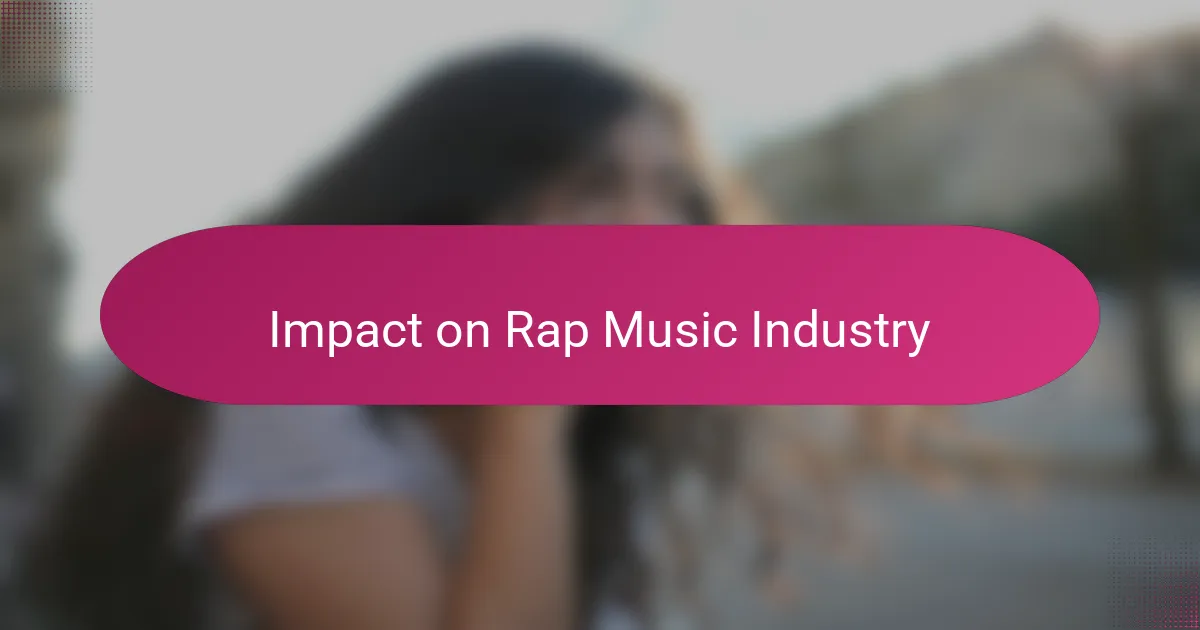
Impact on Rap Music Industry
Drake’s latest album doesn’t just add another chapter to his discography—it feels like it’s nudging the entire rap scene forward. I’ve noticed how his blend of introspective lyrics and polished production is setting new standards that other artists seem eager to match. Have you caught how this pushes rappers to be more vulnerable and experimental without losing their edge?
It’s fascinating to me how Drake’s commercial success with this album redefines what a mainstream rap project can be. I remember a time when radio hits were mostly about catchy hooks and flexing; now, his work proves depth and emotional complexity can coexist with chart-topping appeal. Isn’t it refreshing to see that kind of shift influencing the industry’s priorities?
From my perspective, the album’s impact is also cultural—sparking conversations around themes like mental health and identity within the rap community. That ripple effect encourages artists to open up in ways that feel authentic rather than forced. Do you think this could be a turning point for rap’s emotional honesty? I certainly hope so.
